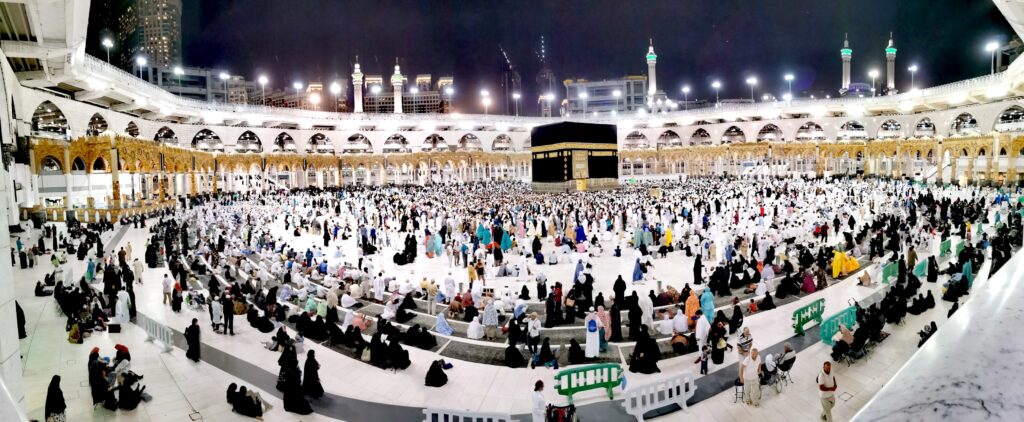Guidance regarding basic Islamic issues – which Hazrat Amirul Momineen, Khalifatul Masih Vaa has given on various occasions in his written correspondence and during MTA programmes – is being officially published below for everyone’s benefit.
Disorder caused by humans

Someone from Canada sent Hazrat Amirul Momineen, Khalifatul Masih Vaa his interpretation of the following Quranic verse:
وَ اِذَا تَوَلّٰي سَعٰي فِي الۡاَرۡضِ لِيُفۡسِدَ فِيۡہَا وَ يُہۡلِکَ الۡحَرۡثَ وَ النَّسۡلَ ؕ وَ اللّٰہُ لَا يُحِبُّ الۡفَسَادَ
“And when he is in authority, he runs about in the land to create disorder in it and destroy the crops and the progeny [of man]; and Allah loves not disorder.” (Surah al-Baqarah, Ch.2: V.206)
The individual interpreted the “destruction of the crops and the progeny” mentioned in this verse to mean the attempt at physical, mental and doctrinal change among humans by tampering with DNA and RNA and sought guidance from Huzoor-e-Anwaraa in this regard.
Huzoor-e-Anwaraa, in his letter dated 24 November 2021, provided the following guidance regarding this matter:
“In accordance with the promise of Allah the Exalted, the Holy Quran has been revealed to guide humankind until the Day of Judgment. Hence, Allah the Exalted states in the Holy Quran:
وَإِنْ مِنْ شَيْءٍ إِلَّا عِنْدَنَا خَزَائِنُهُ وَمَا نُنَزِّلُهُ إِلَّا بِقَدَرٍ مَعْلُومٍ
“‘And there is not a thing but are [limitless] treasures thereof with Us and We send it not down except in a known measure [according to the needs of every era].’ (Surah al-Hijr, Ch.15: V.22)
“The interpretation you provided for the verse from a scientific perspective is correct and there is nothing wrong with it. The subject of human destruction as a result of tampering with DNA has also been discussed by Hazrat Khalifatul Masih IVrh on some occasions. Hence, under the topic of genetic engineering, in his magnum opus ‘Revelation, Rationality, Knowledge, and Truth’, he has also addressed the negative consequences of such adverse tempering in human creation and warned scientists and governments about them.
“Similarly, Hazrat Khalifatul Masih Ira, Hazrat Khalifatul Masih IIra, and Hazrat Khalifatul Masih IIIrh also gave very insightful interpretations of this verse in their respective times. In those interpretations too, mankind has been cautioned against taking such adverse measures. Hazrat Musleh-e-Maudra, for instance, interprets this verse as follows:
“‘[This verse points out that] these individuals are such that when they assume power – that is, when they acquire authority by employing God-given faculties – instead of serving their country or its people, and establishing a sense of peace and security in the hearts of people, they introduce measures that lead to conflict between people of different countries, tribes and religions, and create chaos in the land. They also adopt ways that destroy the country’s social and moral fabric and bring ruin to future generations.
“‘The word ‘harth’ in the Quranic verse literally means an ‘agricultural crop’, but here it is used figuratively with a wider connotation to mean that instead of employing means to improve the state of the society, these individuals enact laws that destroy the country’s society, its economy and its financial situation. In this way, they create obstacles for the progress of future generations and pass laws that deprive them of the capacity and knowledge needed for growth and development.’ (Tafsir-e-Kabir, Vol. 2, pp. 453-454)
“Similarly, in his Friday sermons, delivered on 28 July and 11 August 1972, Hazrat Khalifatul Masih IIIrh interpreted verse 206 of Surah al-Baqarah and stated that the misuse of God-given capacities and faculties is damaging to humanity. He warned of the wrath of Allah the Exalted that would result from this. These two sermons by Huzoorrh have been published in the fourth volume of Khutbat-e-Nasir and are available for everyone to study.”
Questioning faith

Someone from the USA wrote to Hazrat Amirul Momineen, Khalifatul Masih Vaa and asked to what extent one was allowed to raise questions about Islam, the Holy Quran and the Jamaat. He also added that he had asked the local murabbi about the prohibition of usury before Islam, as well as about men and women praying together on the occasion of Hajj, but he had not received a satisfactory answer to his questions.
Moreover, the individual mentioned Huzooraa had said, while answering a question during a mulaqat with Lajna Imaillah, that “there is no place for ‘why’ and ‘for what reason’ in matters of faith”. The person requested Huzooraa for further guidance in this regard.
Huzoor-e-Anwaraa, in his letter dated 26 November 2021, provided the following guidance:
“Islam has allowed one to ask questions to increase one’s knowledge, as Allah states:
فَسۡـَٔلُوۡۤا اَھۡلَ الذِّکۡرِ اِنۡ کُنۡتُمۡ لَا تَعۡلَمُوۡنَ
“‘So, ask those who possess the Reminder, if you know not.’ (Surah an-Nahl, 16:44)
“However, Allah the Exalted prohibits asking absurd, irrational and impolite questions, put forward just for the sake of debate. Hence, He states:
يٰۤاَيُّہَا الَّذِيۡنَ اٰمَنُوۡا لَا تَسۡـَٔلُوۡا عَنۡ اَشۡيَآءَ اِنۡ تُبۡدَ لَکُمۡ تَسُؤۡکُمۡ
“‘O ye who believe! ask not about things which, if revealed to you, would cause you trouble.’ (Surah al-Ma’idah, Ch.5: V.102)
“Likewise, He states:
اَمۡ تُرِيۡدُوۡنَ اَنۡ تَسۡـَٔلُوۡا رَسُوۡلَکُمۡ کَمَا سُئِلَ مُوۡسٰي مِنۡ قَبۡلُ
“‘Would you question the Messenger sent to you as Moses was questioned before this?’ (Surah al-Baqarah, Ch.2: V109)
“Hence, the Holy Prophet’ssa companions were very cautious about asking questions. They narrate that they did not ask questions themselves, but used to wait for some bedouin to come along and ask the Holy Prophetsa a question so that they may increase their knowledge by listening to the answer. Moreover, it is mentioned in the Hadith that Allah the Exalted would quench their thirst for knowledge in this way that sometimes He would send Hazrat Jibra’ilas [Gabriel] in the likeness of a human being, who would ask the Holy Prophetsa questions, and receive their answers. In this way, the companions would have their thirst for knowledge quenched. (Sahih al-Bukhari, Kitab tafsiri l-Qur’an, Bab qawlihi inn Allaha ‘indahu ‘Ilmu s-sa‘ah)
With regard to asking questions, the Promised Messiahas states:
“‘There are many such people who, if they develop a doubt in their hearts, do not make an effort to have it removed and do not ask questions about it. Due to this, that doubt keeps growing inside, then gives birth to more doubts and suspicions and ultimately destroys the person’s soul. Such weakness – that is, forming one’s own opinion about a matter although it was not understood properly and no effort was made to have it clarified – leads to hypocrisy. I do not consider what leads to the ruin of a person’s soul to be courtesy. Yes, it is true that asking questions about every trivial matter is not proper and that is not permitted.’ (Al Hakam, Vol. 7, no. 13, 10 April 1903, p. 1)
“Thus, asking questions is not prohibited, and one should, by all means, ask if they do not understand something. However, making it a habit to repeatedly ask questions regarding every trivial matter for the purpose of debate is not considered appropriate.
“Moreover, it should also be kept in mind that the Holy Quran is the Word of God and a book that consists of the teachings revealed by Him. It is a fact that not everyone is capable of grasping the wisdom and depth of the Word of God Almighty. We observe that human endeavours in research yield new findings on a daily basis. In the same way, new insights and wisdom of the teachings revealed by Allah the Exalted and His commands also continue to be uncovered in every era. Hence, Allah the Exalted states in the Holy Quran:
وَإِنْ مِنْ شَيْءٍ إِلَّا عِنْدَنَا خَزَائِنُهُ وَمَا نُنَزِّلُهُ إِلَّا بِقَدَرٍ مَعْلُومٍ
“‘And there is not a thing but are [limitless] treasures thereof with Us and We send it not down except in a known measure [according to the needs of every era].’ (Surah al-Hijr, Ch.15: V.22)
“In this verse, Allah the Exalted explains that as the Holy Quran is His timeless and lasting Word and contains teachings for the welfare, direction and guidance of humankind until the Day of Resurrection, which will be extracted and drawn upon as needed in each era, therefore, it is not essential for all facets of His Words to be comprehended by a human being at once.
“Hazrat Khalifatul Masih IIIrh states:
“‘Allah the Exalted states that this is a perfect book given to humankind and it will continue to guide them forever. It will never happen that they need any direction or guidance other than the Holy Quran. The Holy Quran has foretold future events and it contains prophecies about every century that are unveiled at their appointed times. […] Almost fourteen hundred years have passed since the revelation of this perfect book. Its history practically demonstrates that God will continue to deal with humankind through the Holy Quran in the same way in the future, revealing ever-new insights as has been foretold and thereby fulfilling its prophecies. As fresh issues emerge, God Almighty will impart new interpretations of the Holy Quran to His beloved and devoted servants, enabling them to address those issues.’ (Friday Sermon, 1 July 1977, Khutbat-e-Nasir, Vol. 7, p. 113)
“In another place, the Holy Quran guides us in this regard as follows:
ہُوَ الَّذِيۡۤ اَنۡزَلَ عَلَيۡکَ الۡکِتٰبَ مِنۡہُ اٰيٰتٌ مُّحۡکَمٰتٌ ہُنَّ اُمُّ الۡکِتٰبِ وَاُخَرُ مُتَشٰبِہٰتٌ ؕ فَاَمَّا الَّذِيۡنَ فِيۡ قُلُوۡبِہِمۡ زَيۡغٌ فَيَتَّبِعُوۡنَ مَا تَشَابَہَ مِنۡہُ ابۡتِغَآءَ الۡفِتۡنَةِ وَابۡتِغَآءَ تَاۡوِيۡلِہٖ ۚ وَمَا يَعۡلَمُ تَاۡوِيۡلَہٗۤ اِلَّا اللّٰہُ ۘؔ وَالرّٰسِخُوۡنَ فِي الۡعِلۡمِ يَقُوۡلُوۡنَ اٰمَنَّا بِہٖ ۙ کُلٌّ مِّنۡ عِنۡدِ رَبِّنَا ۚ وَمَا يَذَّکَّرُ اِلَّاۤ اُولُوا الۡاَلۡبَابِ
“‘He it is Who has sent down to thee the Book; in it there are verses that are decisive in meaning — they are the basis of the Book — and there are others that are susceptible of different interpretations. But those in whose hearts is perversity pursue such thereof as are susceptible of different interpretations, seeking discord and seeking [wrong] interpretation of it. And none knows its [right] interpretation except Allah and those who are firmly grounded in knowledge; they say, ‘We believe in it; the whole is from our Lord.’ — And none heed except those gifted with understanding.’ (Surah Aal-e-‘Imran, Ch. 3: V. 8)
“Hazrat Khalifatul Masih Ira interprets this verse as follows:
“‘In my view, every person’s discourse contains a component that is muhkam, straightforward and easily understood, and another component that is challenging to grasp and can have multiple meanings due to its brevity. This is true for everyone. Allah has shown the following approach in this regard: verses that are clearly understood and are not challenged by experience, intellect, or observation should be deemed muhkam. Moreover, verses, whose meanings one does not understand, should not be interpreted in a manner that contradicts those considered muhkam. […] In summary, some verses are well understood, while the meanings of others are not immediately apparent. A method has been explained for this. […] [Allah] says those who wish to be firmly grounded in knowledge, immediately accept the muhkamat [that are decisive in meaning] and do not deny the mutashabihat [that are susceptible of different interpretations], rather they say کُلٌّ مِّنۡ عِنۡدِ رَبِّنَا, that is, they believe both to be from the Lord. Therefore, they do not interpret mutashabihat in such a way that contradicts the muhkamat. Rather, they keep in mind the principle of کُلٌّ مِّنۡ عِنۡدِ رَبِّنَا everywhere. Irrespective of the number of interpretations a verse may have, it should not be assigned meanings that contradict the muhkamat. The second method is prayer, which He has taught as follows:
رَبَّنَا لَا تُزِغۡ قُلُوۡبَنَا بَعۡدَ اِذۡ ھَدَيۡتَنَا
“‘It means, ‘O our Lord, save us from perversity; that we may not interpret the Holy Quran according to our own desires.’ (Haqaiq-ul-Furqan, Vol. 1, pp. 447-448)
“Hazrat Khalifatul Masih IIIrh states:
“‘There are also mutashabihat in the Holy Quran that require interpretation. Many aspects of these mutashabihat are hidden under the veil of certain metaphors and they are unveiled in due course. As I said at the beginning, it is a magnificence of the Holy Quran, a great characteristic that it is a scripture that provides means for the betterment of humankind until the Day of Resurrection. Every person from every century, every era, every region and every country is in need of the Holy Quran and will never be free from this need.’ (Friday Sermon, 1 July 1977, Khutbat-e-Nasir, Vol. 7, p. 114-115)
“Thus, the above sayings guide us that if we do not understand any of the religious matters or do not get a satisfactory answer from someone, then in such a case we should first try to find a solution to the issue at hand by reflecting and pondering over the muhkam verities of the Holy Quran and the Hadith. Moreover, one should ask Allah the Exalted for guidance regarding these issues by humbly supplicating to Him, and bowing before Him.
“As far as the rest of your question is concerned, in the meeting with Lajna Imaillah Germany, I drew the attention of the Secretary Nasirat to the tarbiyat of the nasirat and said, ‘There is no place for ‘why’ and ‘for what reason’ in matters of faith. Belief in the unseen should be inculcated in their minds at an early age.” That also meant that some matters related to religion are very clear and easily understood, while others have been kept under the veil of faith in the unseen by Allah the Exalted, owing to His boundless wisdom. Grasping their true essence or comprehending them is beyond a human’s exceptionally limited knowledge. Thus, in matters of religious decrees, just as we obey easily understood commandments and inculcate them in our lives, so too is it our duty to obey such orders that are related to faith in the unseen and not to harbour unnecessary doubts.”
Prohibition of interest before Islam

“The answer to your question about the prohibition of interest before Islam and the prayer of men and women together on the occasion of Hajj is as follows:
“It is true that usury was prohibited even among Jews before Islam. Hence, the Holy Quran says, God forbade the Jews pure things which had been allowed to them, because of their taking interest, although they had been forbidden it. (Surah an-Nisa, Ch.4: V.161-162)
“Prohibition of usury has been described in many books of the Old Testament. However, taking interest from non-Israelites and foreigners is also allowed in Deuteronomy. Hence, it states:
“‘Unto a stranger thou mayest lend upon usury; but unto thy brother thou shalt not lend upon usury: that the Lord thy God may bless thee in all that thou settest thine hand to in the land whither thou goest to possess it. When thou shalt vow a vow unto the Lord thy God, thou shalt not slack to pay it: for the Lord thy God will surely require it of thee; and it would be sin in thee.’ (KJV, Deuteronomy 23:20-21)
“From the statement of the Holy Quran, one learns that Allah the Exalted had forbidden interest to the Jews as well, but later on, just as they distorted other commandments of Allah the Exalted to suit their own desires, they interpolated in this commandment too by levying interest on Gentiles, and thus incurring divine punishment.
“On the other hand, just as other vices have been prohibited in Islam, while going into great detail, interest has also been explicitly declared forbidden by the Holy Quran. Every aspect of the evils of usurious transactions has been described and it has been termed a ‘war against Allah and His Messengersa’ and Muslims have been advised to steer clear of it altogether.
“Furthermore, the Holy Prophetsa emphasised the wickedness of interest on numerous occasions, and denounced those who receive it, those who pay it out, those who are involved in its official business, and those who serve as witnesses for it. (Sahih Muslim, Kitab al-Musaqat, Bab la‘ni akili r-riba wa mu’kilih) And on the occasion of his Khutbatu l-Wida‘, the Farewell Sermon, the Holy Prophet, speaking on the prohibition of interest, announced the abolition of all past usurious transactions. (Sunan Abi Dawud, Kitab al-Buyu‘, Bab fi wad‘i r-riba)
“Likewise, the Promised Messiahas, the most ardent devotee of the Holy Prophetsa, also highlighted the seriousness of the sin of dealing with interest and said that, Allah has permitted the consumption of pork when one is driven by necessity [iztirar], but He did not say that it was permitted to deal with interest under such circumstances. (Badr, Qadian, No. 5, Vol. 7, 6 February 1908, p. 6)”
Congregational worship by men and women during Hajj

“There are designated areas for men and women to pray around the Kaaba. In early Islam, even during the blessed era of the Holy Prophetsa, women used to pray apart from men in such a way that their rows were at the end of the mosque, children were in front of them, and men were in front of the children.
“Similarly, at the time of the circumambulation [tawaf] of the Kaaba, men and women used to perform tawaf in the same place but the women stayed apart from men. Hence, it is mentioned in a hadith that when Ibn Hisham (the governor of Mecca) forbade women from performing tawaf with men, Ata bin Abi Rabah said to him, ‘How do you forbid them while the wives of the Prophetsa used to perform tawaf with the men?’ (Ibn Juraij states), ‘I said, ‘Was this before decreeing of the use of the hijab or after it? Ata took an oath and said, ‘I saw it after the revelation of the commandment regarding hijab.’ I said, ‘How did they mix with the men?’ Ata said, ‘The women never mixed with the men, and Aishara used to perform tawaf separately, at a distance, and never mixed with men. Once it so happened that Aishara was performing the tawaf and a woman said to her, ‘O Mother of Believers! Let us kiss the Black Stone.’ Aishara said to her, ‘Go yourself,’ and she herself refused to do so. (The ladies) used to come out at night in disguise and used to perform tawaf with men (without being recognised). However, whenever they intended to enter the Kaaba, they would stay outside until the men had gone out.’ (Sahih al-Bukhari, Kitab al-hajj, Bab tawafi n-nisa’i ma‘a r-rijal)
“Apart from this, there also seems to have been this wisdom in the condition that the sharia had initially set for a woman to have a mahram [close male relative] with her during Hajj and ‘umrah, that when there is a large crowd of people, a lady’s mahram may assist her by clasping her hand, and may shield her from the throng.”
(Compiled by Zaheer Ahmad Khan, Head of Records Department, Private Secretariat, London. Translated by Al Hakam.)

